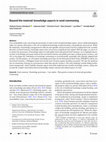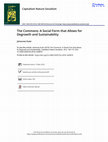Papers by Johannes Euler

Agriculture and Human Values, 2020
Core sustainability issues concerning the governance of seeds revolve around knowledge aspects, s... more Core sustainability issues concerning the governance of seeds revolve around knowledge aspects, such as intellectual property rights over genetic information or the role of traditional knowledge in plant breeding, seed production and seed use. While the importance of knowledge management for efficient and equitable seed governance has been emphasized in the scientific discourse on Seed Commons, knowledge aspects have not yet been adequately studied. With this paper, we aim to (i) demonstrate the relevance of knowledge aspects in Seed Commons, (ii) show current disconnections in knowledge governance between local Seed Commons and the global commons of plant genetic resources, and (iii) analyze the contribution of local and global knowledge governance to environmentally sustainable and culturally adapted seed systems. For this purpose, we will analyze knowledge governance aspects of two local Seed Commons, a Philippine farmer-led network and a German organic-breeding association, and the International Treaty on Plant Genetic Resources for Food and Agriculture.
Since most analytical frameworks in commons studies are specified for application to either material or immaterial resources, we take the lens of the social practices of commoning. We adapt and apply the commons conceptualization by Kostakis & Bauwens (2014) as an analytical framework to describe, compare and relate the knowledge governance aspects of local and international Seed Commons. The main challenges include finding institutional arrangements which fruitfully integrate aspects from both traditional and scientific knowledge systems, taking into account the complex interrelation between knowledge-related, material and cultural aspects of seeds.

Science of the Total Environment, 2018
The European Union Water Framework Directive (EU WFD, 2000) calls for active inclusion of the pub... more The European Union Water Framework Directive (EU WFD, 2000) calls for active inclusion of the public in the governance of waterbodies to enhance the effectiveness and legitimacy of water management schemes across the EU. As complex socio-ecological systems, river basins in western Europe could benefit from further support for inclusive management schemes. This paper makes use of case studies from Germany, England and Spain to explore the potential opportunities and challenges of different participatory management approaches. Grounded in theoretical considerations around participation within ecological management schemes, including Arnstein's Ladder of Participation and commons theories, this work provides an evaluation of each case study based on key indicators, such as inclusivity, representativeness, self-organization, decision-making power, spatial fit and temporal continuity. As investors and the public develop a heightened awareness for long-term sustainability of industrial projects, this analysis supports the suggestion that increased participatory river basin management is both desirable and economically feasible, and should thus be considered a viable option for future projects aiming to move beyond current requirements of the European Union Water Framework Directive.
Ökologisches Wirtschaften, 2020
Das Verständnis von Commons befindet sich im
Wandel. Zunächst wurde damit eine bestimmte Güterar... more Das Verständnis von Commons befindet sich im
Wandel. Zunächst wurde damit eine bestimmte Güterart beschrieben, zunehmend geraten soziale Praktiken in den Blick. Diese Perspektive bietet neue Möglichkeiten für die Commons-Forschung und die Analyse sozial-ökologischer Transformationen.

Capitalism Nature Socialism, 2019
This theoretical article opens with the reconstruction of a value-critical argument which claims ... more This theoretical article opens with the reconstruction of a value-critical argument which claims that capitalism is a form of society that is structurally unsustainable. The reason for this is the need for ever-increasing value production which stems from the core of capitalism (the commodity form, competition, profit maximization, private production) and its internal and external limits. Based on this, the article calls for a fundamental social transformation and positions
the commons as a social form that has the potential to replace the
commodity form as societal foundation. Constituted by social practices
(commoning) that are based on voluntariness, autonomy and needs-
satisfaction, commons do not have an inbuilt growth compulsion. Therefore, the article concludes, the commons may enable humanity to deal with the question of sustainability on the basis of social structures that include the possibility of a solution.

Ecological Economics
The paper proposes a practice theoretical conceptualization of commons. The first part of the pap... more The paper proposes a practice theoretical conceptualization of commons. The first part of the paper asks the question how a convincing conceptualization of commons could look like. Despite of the increased attention to the concept of the commons different notions thereof exist. Ostrom and her colleagues often define commons as common pool resources, a specific type of good. The underlying classification is based on different degrees of excludability and subtractability. In the paper this is criticized for disregarding the importance of the social processes at hand. It is argued that instead of being a type of good, commons need to be conceptualized taking the relevant social dimensions into account. Commons are hence conceptualized as the social form of (tangible and/or intangible) matter that is determined by commoning. Commoning creates commons. In the second part the social practices of commoning are argued to be voluntary and inclusively self-organized activities and mediation of peers who aim at satisfying needs. The abstractness of the proposed conceptualization allows to aim at the core of the practices, at finding a way to find the common characteristics or dimensions of these practices, without defining away their ever specific way of being and becoming in the concrete.
Der Beitrag widmet sich der Frage, inwiefern Commons und Commoning (selbstorganisierte Schaffung ... more Der Beitrag widmet sich der Frage, inwiefern Commons und Commoning (selbstorganisierte Schaffung von Lebensbedingungen) bedeutsam für Kritische Soziale Arbeit sein können. Nach historischen und theoretischen Begriffsbestimmungen wird die Perspektive einer auf Commons basierenden Gesellschaft skizziert. Darauf aufbauend wird argumentiert, dass Commons und Commoning sowohl als Fernziel richtungsleitend für kritisch-emanzipatorische Soziale Arbeit sein können, als auch im Hier und Jetzt das Potential haben, Lebensbedingungen zu verbessern.
The main purpose of this contribution is to give an insight into the radical German commons disco... more The main purpose of this contribution is to give an insight into the radical German commons discourse. It rejects naturalist conceptualizations of commons and rather emphasizes the social dimensions. Combining free software and traditional commons, it builds on and goes beyond the Ostrom's research. Commons are seen as an enabling form and potential foundation for a decentralized and needs-oriented post-capitalist society free of personal and structural domination and beyond the market and state.
Book chapters by Johannes Euler
Degrowth in Movement(s): Exploring pathways for transformation, 2020
ABC der globalen (Un)Ordnung: Von „Antropozän“ bis „Zivilgesellschaft“, 2019
Möglichkeitswissenschaften: Ökonomie mit Möglichkeitssinn, 2019
Perspektiven einer Pluralen Ökonomik, 2019
Konvivialismus. Eine Debatte, 2015
Wir, Leslie Gauditz und Johannes Euler, sind im Commons-Institut e. V. aktiv, einer Gruppe, die u... more Wir, Leslie Gauditz und Johannes Euler, sind im Commons-Institut e. V. aktiv, einer Gruppe, die unter anderem die Schaffung von Wissen und Bildungsarbeit zu Commons fördert. Wir sind knapp dreißig Jahre alt, bildungsbürgerlich aufgewachsen und lohnarbeiten im akademischen Betrieb. Uns hat zusammengebracht, dass wir Commoning betreibende Personen sind, die sich dazu Gedanken machen und Texte schreiben. Um Commonern aus unserem Umfeld die Möglichkeit zu geben, diesen Text mit zu formen, haben wir Vorversionen über unsere Mailinglisten verschickt. Mehrere Menschen haben sich durch sehr hilfreiche Kommentare an dessen Entstehung beteiligt.
Öffentliche Soziologie: Wissenschaft im Dialog mit der Gesellschaft, 2017
Systemwandel: Alternativen zum globalen Kapitalismus (edited by Pablo Solón; Mandelbaum Verlag), 2018

Uploads
Papers by Johannes Euler
Since most analytical frameworks in commons studies are specified for application to either material or immaterial resources, we take the lens of the social practices of commoning. We adapt and apply the commons conceptualization by Kostakis & Bauwens (2014) as an analytical framework to describe, compare and relate the knowledge governance aspects of local and international Seed Commons. The main challenges include finding institutional arrangements which fruitfully integrate aspects from both traditional and scientific knowledge systems, taking into account the complex interrelation between knowledge-related, material and cultural aspects of seeds.
Wandel. Zunächst wurde damit eine bestimmte Güterart beschrieben, zunehmend geraten soziale Praktiken in den Blick. Diese Perspektive bietet neue Möglichkeiten für die Commons-Forschung und die Analyse sozial-ökologischer Transformationen.
the commons as a social form that has the potential to replace the
commodity form as societal foundation. Constituted by social practices
(commoning) that are based on voluntariness, autonomy and needs-
satisfaction, commons do not have an inbuilt growth compulsion. Therefore, the article concludes, the commons may enable humanity to deal with the question of sustainability on the basis of social structures that include the possibility of a solution.
Book chapters by Johannes Euler
Commoning: Zur Kon-struktion einer konvivialen Gesellschaft. In: Adloff, Frank & Volker Heins (eds.): Konvivialismus. Eine Debatte. Transcript Verlag, Bielefeld, Germany, 133-145, 2015.
Translation by Maike Majewski and Wolfgang Höschele published (without the footnotes) March 6, 2016 at https://www.opendemocracy.net/britta-acksel-johannes-euler-leslie-gauditz-silke-helfrich-birgitte-kratzwald-stefan-meretz-flavio-s
Since most analytical frameworks in commons studies are specified for application to either material or immaterial resources, we take the lens of the social practices of commoning. We adapt and apply the commons conceptualization by Kostakis & Bauwens (2014) as an analytical framework to describe, compare and relate the knowledge governance aspects of local and international Seed Commons. The main challenges include finding institutional arrangements which fruitfully integrate aspects from both traditional and scientific knowledge systems, taking into account the complex interrelation between knowledge-related, material and cultural aspects of seeds.
Wandel. Zunächst wurde damit eine bestimmte Güterart beschrieben, zunehmend geraten soziale Praktiken in den Blick. Diese Perspektive bietet neue Möglichkeiten für die Commons-Forschung und die Analyse sozial-ökologischer Transformationen.
the commons as a social form that has the potential to replace the
commodity form as societal foundation. Constituted by social practices
(commoning) that are based on voluntariness, autonomy and needs-
satisfaction, commons do not have an inbuilt growth compulsion. Therefore, the article concludes, the commons may enable humanity to deal with the question of sustainability on the basis of social structures that include the possibility of a solution.
Commoning: Zur Kon-struktion einer konvivialen Gesellschaft. In: Adloff, Frank & Volker Heins (eds.): Konvivialismus. Eine Debatte. Transcript Verlag, Bielefeld, Germany, 133-145, 2015.
Translation by Maike Majewski and Wolfgang Höschele published (without the footnotes) March 6, 2016 at https://www.opendemocracy.net/britta-acksel-johannes-euler-leslie-gauditz-silke-helfrich-birgitte-kratzwald-stefan-meretz-flavio-s